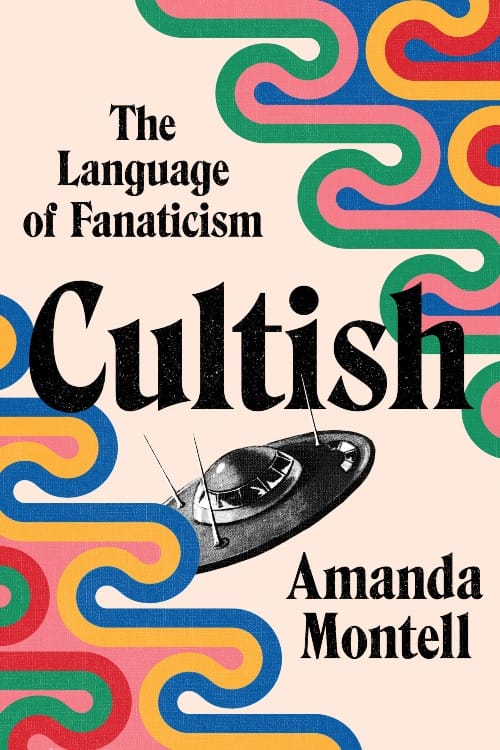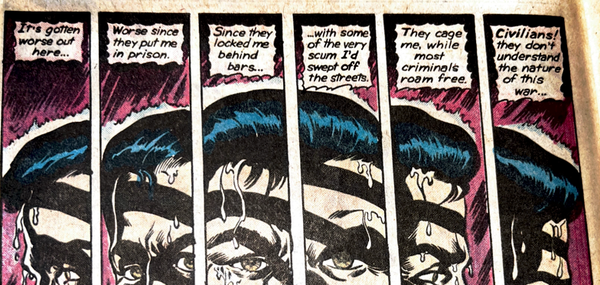Research Note: Cultish
The Language at the Heart of Undue Influence

Cults are everywhere these days. Wild Wild Country, The Vow, Waco: American Apocalypse, The Deep End, and a number of other great documentaries have recently exposed the damage that “high-control” groups wreak on individuals, families, and communities.
Good fictional cults are harder to come by—I can tell you from experience it’s hard to make up one that’s convincing. Some of the best have quirky premises (Chuck Palahniuk’s Survivor) or are more interested in the complex relationships between characters (The Master) than in broader cult dynamics. More common are shows like The Following, which cut and paste cult clichés to serve thriller plots. (There was a lot about The Following to enjoy, but the idea of an ex-English professor who specializes in the American Romantic Period creating a thrill-kill cult inspired by Edgar Allan Poe strains credulity.)

In the real world, the power of a cult is often hinged on its use of specific and unique loaded language, which creates a sense of exclusivity, facilitates in-group bonding, and shuts down cognitive dissonance. Recreating this effect in a fictional setting requires thinking about how language shortcircuits our defense mechanisms against manipulation without resorting to trite depictions of “brainwashing”.

Amanda Montell’s book Cultish is one of the best resources I found on this subject. Montell sees the phenomena of cults as primarily linguistic. “Cultish” language, she writes, is everywhere and is often harmless—until it isn’t.
As Montell put it in a Refinery29 article about New Age lingo:
It’s really no wonder these magical-sounding terms have spread special jargon is just plain fun. Who doesn’t love learning a secret code language? Having an exclusive tongue gives members of a group something to assemble around, and like a snappy new uniform, it makes them feel like they’re a part of something greater and that they’re doing something right with their lives.
But Montell also shows how language-driven in-group psychosocial dynamics can shut down critical thinking to lay the groundwork for “undue influence” that can span anything from an abusive relationship to a national political movement.
Having spent the past two years researching the social science of cult influence, I’ve learned that more than physical violence or some vague concept of “brainwashing,” language is the key means by which all degrees of cult-like influence occur. With emotionally charged buzzwords and euphemisms, renamings, chants, mantras, and even hashtags, pernicious gurus are able to instill ideology, establish an “us” and a “them,” justify questionable behavior, inspire fear, gaslight followers into questioning their own reality… essentially everything a cult needs to do in order to gain and maintain power.
For QAnon, terms like "The Storm", "The Great Awakening", and "Where We Go One, We Go All" (WWG1WGA) are laced with esoteric significance. "Deep State" and "Save the Children" became code words for the conviction that a global cabal of pedophiles controlling world events.
In NXIVM, titles like "Vanguard" for leader Keith Raniere and "Prefect" for co-founder Nancy Salzman created an artificial hierarchy and bestowed an aura of authority to these figures. "Suppressives" and "Lucifarians" were labels for anyone the group's cohesion or mission, essentially isolating members from external criticism or familial concern. Innocuous-sounding terms like "Exploration of Meaning" (EM) veiled its indoctrination techniques. "Ethical Breach" enforced conformity to the group's internal code, punishing any deviation from NXIVM's principles.
Once you're swimming in the semantic ocean of loaded language and thought-stopping clichés, it's hard to climb out.
If you want to understand how the actual mechanisms of cultish language and influence work, I highly recommend Cultish. Once you start listening for loaded language and thought-terminating clichés (or “verbal sedatives” as Montell calls them), you’ll never hear “witch hunt” “fake news” “trust the plan” “deep state” or “save the children” the same way again.
Thanks for reading Write Imitates Life! Subscribe for free to receive new posts and support my work.



